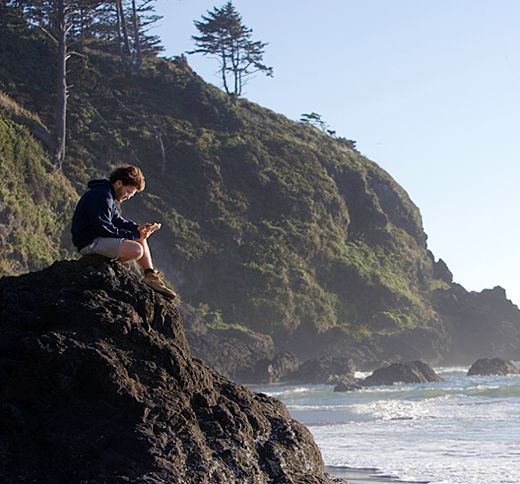 Image above: A still frame from the 2007 movie "Into The Wild". From (http://emerson.typepad.com/emerson/2007/10/into-the-wild.html).
Image above: A still frame from the 2007 movie "Into The Wild". From (http://emerson.typepad.com/emerson/2007/10/into-the-wild.html).
By Jamie Heimbuch on 4 June 2010 in TreeHugger.org - (http://www.treehugger.com/files/2010/06/want-to-feel-more-alive-study-shows-you-need-to-go-outside.php)
We kind of already know this - if not intuitively then through past studies - but a new study has shown that when you spend more time out in nature, you feel more alive. Published in this month's issue of the Journal of Environmental Psychology, the study shows that getting out and communing with nature is better for feeling rejuvenated than reaching for the ever-so-urban cup of coffee. "Nature is fuel for the soul, " says Richard Ryan, lead author and a professor of psychology at the University of Rochester. Both physically and mentally, we're zippier when we step into the wild.
Science Daily writes, "The findings, adds Ryan, are important for both mental and physical health. 'Research has shown that people with a greater sense of vitality don't just have more energy for things they want to do, they are also more resilient to physical illnesses. One of the pathways to health may be to spend more time in natural settings,' says Ryan."
The idea of getting out in nature to improve our spirits and therefore our physical health goes hand in hand with nature deficit disorder - the diminished use of the senses, difficulty with attention and higher rates of illness associated with an estrangement from nature, from the real world. Past studies have even shown that we're kinder, more gentle folks when we feel in-touch with the natural world.
It really should come as no surprise that as we pull ourselves away from the world in which we evolved, that sustains us and keeps us ticking, we're going to function less efficiently. Think about it - how often have we witnessed animals living in captivity just wither away from depression or unexplained illness? Well, humans are animals. We need our green scene.
The authors of this particular study wanted to find out the effects of nature alone, apart from other factors. So, they performed five experiments on 537 college students, including sending them on a 15 minute walk through either a hallway or a tree-lined path, showing scenes of cityscapes or landscapes, and imagining themselves in scenes either sedentary or active, inside or out and with or without others. Across the board, those participants who spent time or imagined themselves in natural settings consistently felt more energetic, and the final results are that if you spend just 20 minutes a day in nature, vitality levels will significantly rise.
"We have a natural connection with living things," says Ryan. "Nature is something within which we flourish, so having it be more a part of our lives is critical, especially when we live and work in built environments."
So, if you're feeling tired, listless, worn out, if you're pooped at parties... Go. Out. Side. In fact, there's an app for that.
Nature Makes Us Nicer People By Jamie Heimbuch on 15 October 2009 in TreeHugger.org - (http://www.treehugger.com/files/2009/10/nature-makes-us-nicer-people-new-study-says.php) Don't disregard those wall calendars showing far-off nature scenes quite yet. It just might make you a more caring, community-oriented, and generous person. A new study by the University of Rochester found that after looking at nature scenes, people feel closer to their community, are willing to give more money to a charitable cause, and care more about social outcomes than they are after looking at man-made scenes. The reason, the researchers state, it communing with nature helps people also commune with their basic values.
The University of Rochester reports what we all have been savvy to for awhile now, that seeing naturescapes helps reduces stress, and even having a window in a hospital room helps people recover more quickly. "While the salubrious effects of nature are well documented... this study shows that the benefits extend to a person's values and actions. Exposure to natural as opposed to man-made environments leads people to value community and close relationships and to be more generous with money, find [Richard] Ryan and his team of researchers at the University of Rochester.
From experiments including 370 participants, the results show that after viewing urban settings or natural settings, people exposed to natural settings rated close relationships and community higher than they had before seeing the scenes, whereas after viewing urban settings, people placed more value on wealth and fame. Additionally, those who viewed nature scenes were more likely to give higher amounts of money to a good cause.
"Lead author Netta Weinstein says that the findings highlight the importance of creating green spaces in cities and have implication for planners and architects. Incorporating parks and other representations of nature into urban environments may help build a stronger sense of community among residents, she explains. By contrast, "to the extent that our links with nature are disrupted, we may also lose some connection with each other," the authors warn."
If it is the case that being around and seeing nature makes us more people-oriented and generous, perhaps we should flood the offices of Copenhagen delegates with plants, scenes from natural settings, and earthy furniture so that they're really ready to negotiate with the future of the planet front and center.
.
No comments :
Post a Comment